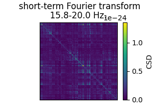mne.time_frequency.csd_fourier¶
- mne.time_frequency.csd_fourier(epochs, fmin=0, fmax=inf, tmin=None, tmax=None, picks=None, n_fft=None, projs=None, n_jobs=1, verbose=None)[source]¶
Estimate cross-spectral density from an array using short-time fourier.
- Parameters
- epochsinstance of
Epochs The epochs to compute the CSD for.
- fmin
float Minimum frequency of interest, in Hertz.
- fmax
float|numpy.inf Maximum frequency of interest, in Hertz.
- tmin
float|None Minimum time instant to consider, in seconds. If
Nonestart at first sample.- tmax
float|None Maximum time instant to consider, in seconds. If
Noneend at last sample.- picks
str|list|slice|None Channels to include. Slices and lists of integers will be interpreted as channel indices. In lists, channel type strings (e.g.,
['meg', 'eeg']) will pick channels of those types, channel name strings (e.g.,['MEG0111', 'MEG2623']will pick the given channels. Can also be the string values “all” to pick all channels, or “data” to pick data channels. None (default) will pick good data channels (excluding reference MEG channels). Note that channels ininfo['bads']will be included if their names or indices are explicitly provided.- n_fft
int|None Length of the FFT. If
None, the exact number of samples betweentminandtmaxwill be used.- projs
listofProjection|None List of projectors to store in the CSD object. Defaults to
None, which means the projectors defined in the Epochs object will by copied.- n_jobs
int The number of jobs to run in parallel (default 1). Requires the joblib package.
- verbosebool,
str,int, orNone If not None, override default verbose level (see
mne.verbose()and Logging documentation for more). If used, it should be passed as a keyword-argument only.
- epochsinstance of
- Returns
- csdinstance of
CrossSpectralDensity The computed cross-spectral density.
- csdinstance of
